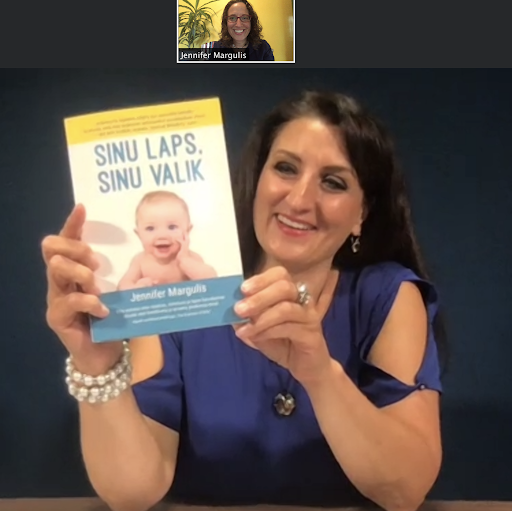
Estonian TV journalist Carmen Pritson has been investigating vaccine opposition in Estonia and interviewing parents of vaccine-injured children. Photo credit: Ardo Kaljuvee.
Vaccine opposition in Estonia is on the rise. The Republic of Estonia has only 1.3 million inhabitants but hundreds, if not thousands, of Estonian parents, are now expressing concerns and voicing vaccine opposition.
The concern is not over all vaccines, per se, but over the safety and necessity of the current vaccine recommendations in Estonia.
Over the last few years, Estonians have become more aware of vaccine side effects. According to Estonian news, nearly half of school-age children are not fully vaccinated.
TV journalist Carmen Pritson
To shed light on vaccine opposition, vaccine safety, and safe vaccination, a beloved TV journalist and mom, Carmen Pritson, has been working with the Estonian non-profit organization, Parents of Vaccine Injured Children, to produce a series called “Openly and Honestly about Your Health.”
Watch the trailer:
TV journalist Carmen Pritson interviewed me recently. Via Zoom.
She asked me questions about children’s health, vaccine opposition, vaccine safety, and safe vaccination. We talked about the rise in C-section birth. Pritson has had two. We also discussed the way the medical system derails women from achieving their breastfeeding goals. And why certain vaccine recommendations are not promoting children’s health.
Pritson began the interview by admitting that she had no idea that vaccine opposition and vaccine safety concerns were such controversial topics. In a country that prides itself on openness, the series has already been subjected to censorship.
“I am not anti-vaccine. And I am not pro-vaccine. I’m just interested in learning more than our family doctors can tell us,” Pritson explains.
Is there anything valid about vaccine opposition?
Pritson used to vaccinate herself and her family against the flu. But she and her children got influenza nonetheless. So in the last two years, she’s realized a flu vaccine is not necessary.
In fact, once her family stopped doing the flu vaccine everyone was much healthier.
Indeed, influenza vaccine efficacy varies greatly from year to year. During the 2017-2018 season, the vaccine was only 38 percent efficacious.
The efficacy of the flu vaccine was higher for children during the 2018-2019 flu season but even lower for adults. In people aged 50 and older, it was only 24 percent effective.
These numbers are discouraging. And research done in Canada suggests that getting the flu vaccine more than one year in a row results in lowered protection against the flu. This finding has been seen in earlier studies. It may be the main reason for the high rates of flu vaccine refusal among medical professionals.
In Estonia pregnant women do not receive any vaccines. In America, by contrast, most pregnant women get at least three. Doctors push the vaccine against tetanus, diphtheria, and pertussis (Tdap) and—if the pregnancy spans more than one flu season—two influenza vaccines.
But, as Cindy Schneider, M.D., also explains, giving pregnant women vaccines can provoke a dangerous inflammatory response.
“Millions of women who are pregnant or hoping to become pregnant in the near future now face the annual decision of whether or not to receive a flu shot. Women must carefully consider the new data available,” Schneider writes.
“While intended to protect pregnant women and their babies, influenza vaccines may inadvertently be doing more harm than good.”
Estonians concerned about over-vaccination
Even the most staunch defenders of the current vaccine recommendations acknowledge that there are risks involved with vaccines. The Supreme Court argued in 2010 and ruled in 2011 that vaccine side effects are sometimes “unavoidable.”
Vaccine opposition in Estonia and around the world comes from this fact: Even when necessary and used properly, vaccines can be unavoidably unsafe for some children and adults.

Behind the scenes: Carmen Pritson is an Estonian TV journalist who is exploring vaccine opposition in Estonia. Featured here holding up the Estonian version of the book, Your Baby, Your Way. Carmen interviewed Jennifer Margulis via Zoom for a forthcoming series about vaccine safety. Photo by Jennifer Margulis.
The dangers posed by over-vaccination are not necessarily immediate. Vaccine injury can be cumulative and happen over several years.
As researcher Neil Z. Miller explores in his excellent book, Miller’s Review of Critical Vaccine Studies, and as my co-author, Paul Thomas, M.D., and I explore in some detail in our book, The Vaccine-Friendly Plan, high-quality, peer-reviewed scientific research links vaccines to brain and immune damage. In fact, over-vaccination can trigger encephalitis, encephalopathy, and auto-immune disorders.
Pritson herself has first-hand experience with vaccine-induced injuries. Her good friend’s daughter became autistic after vaccination.
Present at the birth, Pritson spent a lot of time with the baby during her first months. She was “a curious girl with very clear eyes. But she suddenly became sort of a lump that had no control over her body anymore. After the vaccine she also developed a serious skin rash and fever,” Pritson says.
The doctor prescribed antibiotics. But the girl’s condition did not improve. Later a different, more evidence-based pediatrician told the parents that it wasn’t safe to give this child any more vaccines.
Open conversations about health, vaccine safety, and vaccine opposition
The interview series will be available in both Estonian and English. It will feature doctors, scientists, researchers, and other specialists who are knowledgeable about vaccines and related topics.
Interviews will include information about vaccine ingredients, vaccine efficacy, vaccine necessity, vaccines and autoimmune disorders, vaccines and cancer, delaying vaccines, and vaccine opposition.
“I want to talk about this, because I’m interested in this topic. It’s as simple as that,” Pritson says.
My book, Your Baby, Your Way, is available in Estonian in paperback or as an eBook. You can purchase it here and here.
Related posts:
Coronavirus in Cyprus: Is the Government’s Response Doing More Harm Than Good?
Pregnant? Should You Get the Flu Vaccine?
13 Reasons Why the CDC is Right and You Should Vaccinate Your Kids
Leave a Reply